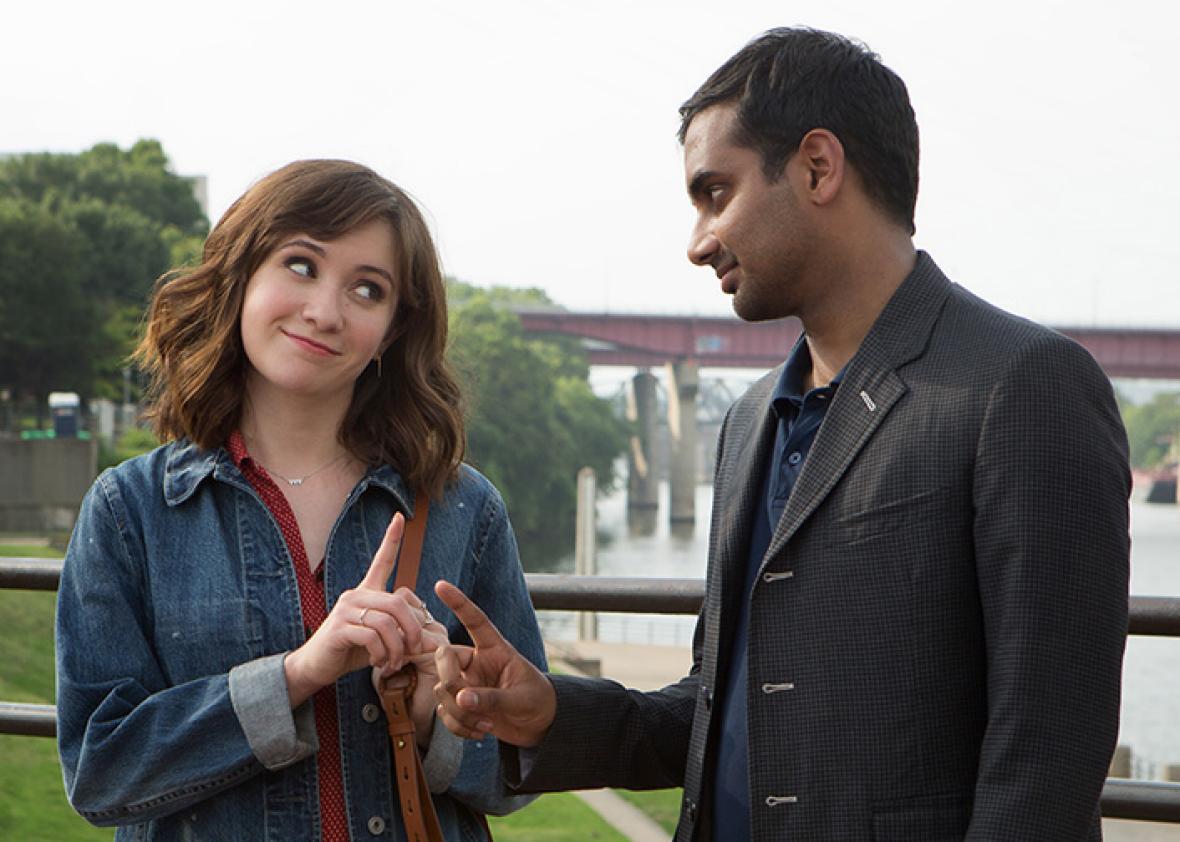There’s a moment in the first episode of Master of None when Dev (Aziz Ansari) and Arnold (Eric Wareheim) are in a boutique toy store, seeking a gift for a friend’s child. One of Dev’s ex-girlfriends strolls in, and the two begin to chat. She has a husband now—an outdoorsy lawyer from Connecticut—as well as a baby and a house in the Hamptons. Dev, surprised and a little smug, cracks wise: “Sounds like a nice white family.” Her reply is swift: “He’s black.”
It’s a good joke, but also a very Master of None joke, in that it turns not on racism so much as race, period: the assumptions, suggestions, and stereotypes that scaffold day-to-day interactions. Dev’s jab relies on a simple premise—a hiking-obsessed, East Coast-bred lawyer named Dylan is probably Caucasian—but it also seems to veil a familiar insecurity, a subterranean fear that brown men are less desirable to women than their white counterparts.
Part of Master of None’s appeal is how gently it weaves race into its narrative, and overanalyzing that single thread in the show’s broader tapestry may seem overly academic. Ansari, a comic whose career has largely consisted of roles in which his ethnicity has been incidental, has leveled up to leading man with surprising aplomb, converting his motor-mouthed wise-guy persona into something more capacious and endearing. Also: more Indian.
The past few years have seen a surge in South Asian–led programming—Kunal Nayyar in The Big Bang Theory, Mindy Kaling in The Mindy Project, Priyanka Chopra in Quantico—but none of these shows is about Indian-Americanness per se. Master of None isn’t either, but its treatment of Indian identity, and race in general, is central—and quietly radical. Instead of catering to an abstract ideal of representation, the show trades in the shaggy compromises and fluctuating truths of the minority experience in America.
Take the fourth episode, “Indians on TV,” which sees Dev and fellow actor Ravi audition for an “unnamed cab driver” role in a crime drama. Ravi emerges from his audition elated. Dev, next in line, does not: The part requires an accent, and he chafes at the idea. The two meet for coffee shortly after, and what follows is something rarely seen on TV: a frank conversation between two people of color about the pros and cons of peddling stereotypes. Ravi offers a simple rationale—he needs work, many cab drivers do have accents—but Dev pushes back, intent on proving that a brown male can get the same sort of everyman roles that Bradley Cooper dines on.
For most shows, the strategy here would be to lament TV’s reductive casting and call it a day. But Master of None goes deeper. It doesn’t want to make a point about how terrible people can be—that sort of self-congratulatory storytelling can quickly flatten minority characters into helpless victims of discrimination. Instead, Ansari and co-creator Alan Yang practice equal-opportunity implication, an approach that treats people of color as conflicted, accountable human beings who are constantly making decisions about how to pass, how to assert themselves, and how to inch around the trapdoors of racism while being prodded by ulterior motives.
This tactic is on full display during the episode’s second act, in which Dev and Ravi try out for an open-ethnicity sitcom called Three Buddies. Both audition well, but network executive Jerry Danvers is reluctant to cast two Indians on the same show, and he accidentally forwards an email chain in which he makes a joke about how Dev needs to “curry favor.” Dev wants to leak the exchange, but his agent Shannon (Danielle Brooks) suggests he not let one offensive email ruin his—and her—shot at “Friends money.” Busta Rhymes, Danvers’ business associate, gives similar advice: “Don’t play the race card; charge it to the race card.”
That’s what Master of None does: Just when you think you’ve grokked every side of an issue, it flings two more at you, and suddenly all prior perspectives are contextualized, their biases thrown into sharp relief. When weighing Busta and Shannon’s thoughts, one wonders: Is there a current here, too, related to the privilege Asian-Americans enjoy compared to other minorities? Is Dev’s willingness to take a stand simply a luxury his black peers can’t afford? Master of None is uncannily attuned to those types of hard, uncomfortable questions. And it’s not averse to hard, uncomfortable answers: After Danvers treats him to a Knicks game, Dev decides to take that Friends money and comply with the network’s one-Indian terms. He doesn’t get the job, but Master of None’s step-by-step illustration of how minorities can be complicit in tokenism is a serious innovation. The realpolitik of navigating racism has never been so brightly lit.
Dev is always interrogating, always wading into the subtext of his own identity. In one episode, he struggles with a classic first-generation hang-up: The guilt of never being as competent, as persevering and self-sacrificing and generous, as his immigrant parents. It’s tough, when trapped between one’s heritage and one’s privilege, not to feel like a mere imitation of an imitation.
The closing scene of “Indians on TV” features three brown men in the frame, none of them emasculated, all of them equipped with intricate, disparate, full-fledged personalities. Watching them, I forgot to exhale. It’s a half-funny, half-terrifying feeling, the realization that a small triumph of representation is having an outsize impact on your emotional state. You wait for the image to implode, for Apu’s sharp T’s and trilled R’s to become the butt of a joke. But the moment never comes. Is Master of None perfect? No—its themes can occasionally seem rote, its protagonist a tad naive. But he’s learning, and so are we.
